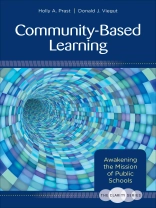To fully prepare K-12 students for life and career, connect with your community!
A successful community-based learning program is a triple win—for students, schools, and the entire community. Curriculum becomes more meaningful and relevant, students are more engaged, and schools and districts benefit from new advocates.
Authors Prast and Viegut show how to move beyond guest speakers and field trips to creating a vibrant program that promotes academic achievement and future career skills. In this second acclaimed book in The Clarity Series, readers will learn how to
- Forge rewarding partnerships with local partners, from major employers to small businesses and community groups
- Implement a high-quality, sustainable initiative that bridges disciplines
- Recognize and overcome barriers to effectiveness
- Apply best practices from today’s most-effective programs
Turn to this helpful guide to tap the limitless opportunities and potential offered by community-based learning.
‘Community-based learning, as described in this series, just might be the missing piece we are looking for on our competency-based, personalized learning quest for our students. If we can bring this work together—if we can connect them to their passion (personalize), move them along when they are ready (competency-based) and ground them in real life experience (community-based), perhaps we can truly give them the roots and the wings we have only been theorizing about for fifty years.’
—Dr. Sandra Dop, Program Consultant
Iowa Department of Education
Содержание
List of Figures and Tables
Preface
Acknowledgments
About the Authors
1. An Introduction to Community-Based Learning
Increase student engagement
Make the curriculum relevant and experiential
Strengthen the connection between the community and schools
The foundation for community-based learning
The levels of community-based learning
Changing the work
2. The Foundation for Community-Based Learning
Learning theory
Learning processes
The social nature of instruction
A vital connection
A new solution to a new problem
3. A Framework for Community-Based Learning
The CBL framework
4. Case Study: Community-Based Learning School
The beginning of community-based learning school
Making progress
Challenges arise
Creating a curriculum
Setback
Exceeding expectations
5. Essential Practices in Community-Based Learning
Drinking the good wine first
Get the right people on the bus
Source your champions
Increase intentionality
Seek transfer
Customization and individualization
Evaluate current partnerships
6. Professional Development for Community-Based Learning
Establish student learning goals
Determine the best practices to achieve those goals
Identify the necessary resources
Decide what teachers need to know and be able to do
Gain the knowledge and skills
CBL needs development
7. Leading Community-Based Learning
Responding to the need for high quality
A tolerance for risk
Situational leadership
Distributive leadership
Mindful leadership
Systems implementation
8. Overcoming Barriers
Time
Large-scale tests
Risk aversion
Partnership peril
Waiting for the right time
Toxic leaders
Facing down detractors
Good to great
Existing structures
Wants over needs
9. Starting Community-Based Learning—Today
For teachers
For principals
For superintendents
For boards of education
For everyone
Appendix: Sample community-based learning unit
References
Index












